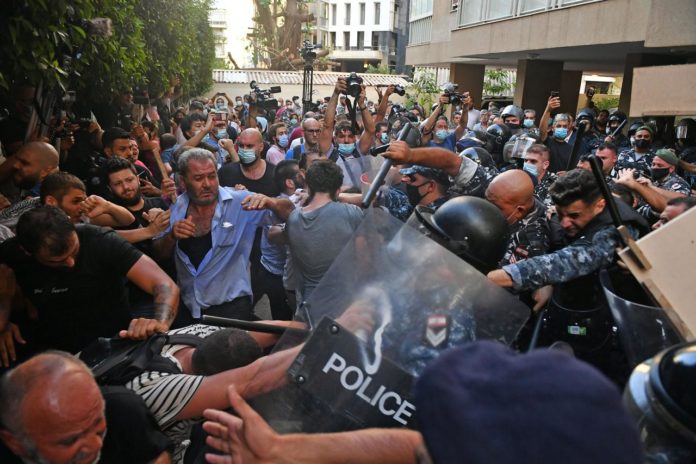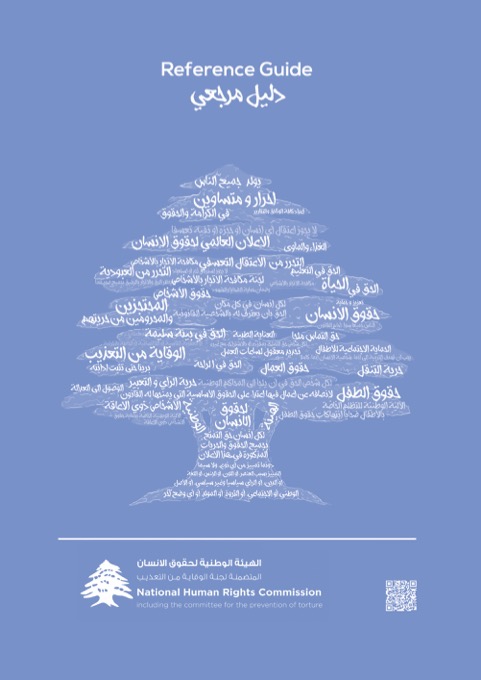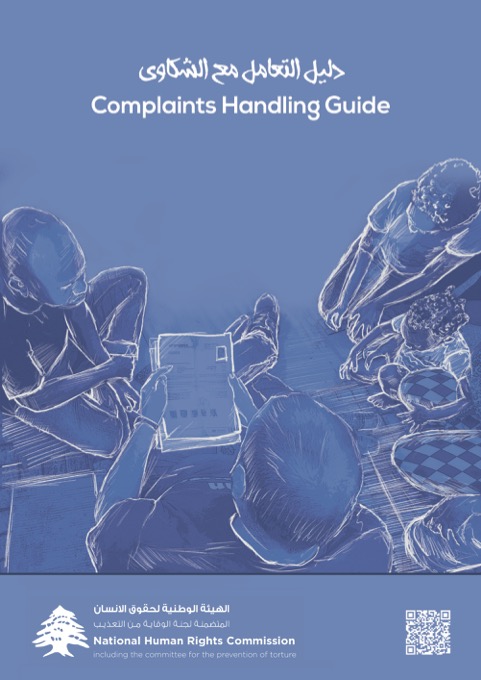هذه المقالة متاحة أيضًا بـ: العربية (Arabic)
Background
Lebanon ratified the Convention against Torture on 5 October 2000, and the Committee against Torture reviewed Lebanon’s initial report in 2017. International Covenant on Civil and Political Rights was ratified on 3 November 1972, and the Human Rights Committee reviewed three periodic reports of Lebanon.
Lebanon appeared before the Committee against Torture (CAT) in April 2017. The CAT Committee recommended, with regard to the Lebanese draft law criminalizing torture that Lebanon ensures an absolute prohibition of torture, defining clear penalties and removing statute of limitations.1
On 20 October 2017, the Parliament adopted the six-article Law No. 65 on the Punishment of Torture and Other Cruel, Inhuman or Degrading Treatment (Law No. 65/2017). This was the first time that Lebanese legislation criminalizes torture. Law No. 65/2017 amended provisions of the Lebanese Penal Code (PC) and the Criminal Procedure Code (CPC). PC was amended to include the definition of torture and sanctions for the crime of torture, and to include an absolute ban on torture. Also, the amendments stipulate that courts must determine a measure of rehabilitating victims of torture in addition to personal compensation. CPC was amended to make inadmissible any evidence obtained under duress, and to specify judicial roles in the prosecution of torture crimes. Finally, Law No. 65/2017 amended CPC to introduce the statute of limitation for the crime of torture.
In March 2018, the Human Rights Committee (the HR Committee) considered the third periodic report of Lebanon on the implementation of the International Covenant on Civil and Political Rights (ICCPR). In its Concluding Observations,2 the HR Committee noted with concern that Law No. 65/2017 does not meet the requirements of Article 7 of ICCPR.
In January 2020, the Human Rights Committee of the Parliament considered amending Law No. 65/2017. This brief aims to contribute to the efforts to bring Law No. 65/2017 in line with applicable international human rights standards.
Comments with regard to issues identified by the HR and CAT Committees
The HR Committee stated the following:
“27. The Committee is concerned that the new law on criminalizing torture, Act No. 65 of 26 October 2017, does not meet the requirements of article 73 of the Covenant, as it: (a) limits the definition of torture to situations of investigation, interrogation, judicial investigation, trial and punishment; (b) fails to criminalize cruel, inhuman and degrading treatment or punishment; (c) includes a statute of limitations for prosecuting torture; (d) prescribes penalties that do not reflect the gravity of the crime; and (e) does not provide for effective remedies and reparation (Articles 2 and 7).
The State party should, as a matter of urgency, amend its criminal legislation with a view to bringing the definition of torture into conformity with article 7 of the Covenant and other internationally accepted standards. It should also ensure that the crime of torture is not subject to a statute of limitations, that penalties for torture are commensurate to the gravity of the crime and that victims have, in law and in practice, access to full reparation, including rehabilitation, adequate compensation and the possibility of seeking civil remedies independent of criminal proceedings.”
Comments will address the relevant issues in order presented by the HR Committee.
Definition
Law No. 65/2017 introduces the definition of torture into the PC.4 The HR Committee noted that the wording of the definition limits torture to situations of investigation, interrogation, judicial investigation, trial and punishment. Given that torture may as well occur outside the frame of these situations, for example as a punishment for another person’s offence, it is necessary to remove the relevant limitation. Further, we recommends that Article 2 (Special Provisions on Illegal Orders) of Law No. 65/20175 is amended to explicitly exclude exceptional circumstances, a state of war or a threat of war, internal political instability or any other public emergency, as a justification of torture (Article 2 of the Convention). In addition, as mentioned in the above-cited Concluding Observations of CAT, attention has to be paid to excluding also exceptional circumstances such as a threat of terrorist acts or violent crime, as well as armed conflict, international or non-international.
criminalization of cruel, inhuman and degrading treatment or punishment
Inhuman or degrading treatment or punishment (CIDT). Accordingly, Law No. 65/2017 should be amended to criminalize CIDT as well. It is important to note that torture and CIDT are both absolutely prohibited under Article 7 of the ICCPR, other international and regional treaty provisions as well as customary international law. The distinction in protection against torture and CIDT stems from the requirements of the Convention against Torture (CAT), which laid down some specific obligations on the States with regard to torture – in the first place with regard to the obligation to criminalize acts of torture and to apply the principle of universal jurisdiction in this regard.
With regard to definitions, Article 1 of CAT defines torture “as any act which consists of the intentional infliction of severe pain or suffering (physical or mental), involving a public official (directly or at the instigation or consent or with the acquiescence of a public official, or another person acting in an official capacity), and for a specific purpose (i.e. extracting a confession, obtaining information, punishment, intimidation, discrimination)”, and it has to be read in conjunction with Article 16, which requires States parties to prevent “other acts of cruel, inhuman or degrading treatment or punishment which do not amount to torture as defined in article 1”.
It follows from a combined reading of both provisions that torture is an aggravated form of cruel, inhuman or degrading treatment or punishment. Acts falling short of the definition in Article 1, where the inflicted pain was not severe, and particularly acts without the elements of intent or acts not carried out for the specific purposes outlined, may comprise cruel or inhuman treatment under Article 16 of the Convention while acts aimed at humiliating the victim constitute degrading treatment or punishment even where severe pain has not been inflicted.
limitations for prosecuting torture
By virtue of Article 3 of Law No. 65/2017 and Article 10 of the CPC, the crime of torture is subjected to the ten-year statute of limitation, which starts to run upon the victim’s release. The Human Rights Committee’s requested that the crime of torture should not be subjected to a statute of limitations as statutes of limitations should not be applicable since these deprive victims of torture related redress, compensation, and rehabilitation.6 The same request was earlier set by CAT in its Concluding Observations.7
Accordingly, Law No. 65/2017 should be amended to explicitly state that the crime of torture should not be subjected to statute of limitations.
penalties that do not reflect the gravity of the crime
Law No. 65/2017 stipulates that the crime of torture – depending on its consequences for a victim – shall be sanctioned with imprisonment from one to ten years, and if the victim died due to torture, the perpetrator shall be imprisoned from ten to twenty years. The Committee considered that these sanctions do not reflect the gravity of the crime of torture. Accordingly, the sanctions should be adequately adjusted. As noted above, Law No. 65/2017 should be amended also to provide sanctions for cruel, inhuman or degrading treatment or punishment. It has to be noted that the Convention against Torture, Article 4.1, requires that an attempt to commit torture, and complicity or participation in torture have to be prescribed as offences under criminal law.
The lack of effective remedies and reparation
Law No. 65/2017, Article 1.c prescribes that “Court shall determine the measure of rehabilitating the victims of torture in addition to personal compensation.” The Committee noted that this provision does not provide for effective remedies and reparation, and requested that the State ensures that victims have, in law and in practice, access to full reparation, including rehabilitation, adequate compensation and the possibility of seeking civil remedies independent of criminal proceedings.
CAT General Comment No. 38, which elaborates on the implementation of Article 149 of the Convention by States parties, provides useful guidance in this matter. It states inter alia that the term “redress” encompasses the concepts of “effective remedy” and “reparation”. The scope of the right to redress thus includes the following five forms of reparation: restitution, compensation, rehabilitation, satisfaction and guarantees of non-repetition. Reparation must be adequate, effective and comprehensive. States parties are reminded that in the determination of redress and reparative measures provided or awarded to a victim of torture or ill-treatment, the specificities and circumstances of each case must be taken into consideration and redress should be tailored to the particular needs of the victim and be proportionate in relation to gravity of the violations committed against them. CAT emphasises that the provision of reparation has an inherent preventive and deterrent effect in relation to future violations.
1 Committee against Torture, Concluding Observations on the initial report of Lebanon. Adopted by the Committee at its sixtieth session (18 April-12 May 2017) https://tbinternet.ohchr.org/_layouts/15/treatybodyexternal/Download.aspx?symbolno=CAT%2FC%2FLBN%2FCO%2F1&Lang=en
2 The Human Rights Committee, Concluding Observations, Adopted by the Committee at its 122nd session (12 March–6 April 2018) https://tbinternet.ohchr.org/_layouts/15/treatybodyexternal/Download.aspx?symbolno=CCPR%2fC%2fLBN%2fCO%2f3&Lang=en
3 Article 7 of ICCPR: “No one shall be subjected to torture or to cruel, inhuman or degrading treatment or punishment. In particular, no one shall be subjected without his free consent to medical or scientific experimentation.”
4 Article 1 of the Law No. 65/2017, first part, reads as follows:
“Incriminating Torture
Article 401 of the Criminal Code shall be amended to read as follows:
a- “Torture under the present Law shall include any act inflicted by or at the instigation of or with the consent or acquiescence of a public official or other person acting in an official capacity during the preliminary survey and investigations, judicial investigation, trials and punishments resulting in severe pain or suffering, whether physical or mental, intentionally inflicted on a person for the purposes below:
obtaining from him/her or a third person information or a confession; • punishing him/her for an act he/she or a third person has committed or is suspected of having committed; • intimidating or coercing him/her or a third person into engaging in an act or refraining therefrom; • inflicting such pain or suffering for any reason based on discrimination of any kind. The definition above does not include pain or suffering arising only from, inherent in or incidental to, lawful sanctions.”
5 “Article 2: Special Provisions on Illegal Orders
The following two paragraphs shall be added to Article 185 of the Criminal Code:
“Whoever is prosecuted for any of the crimes under Article 401 of the present law, shall, on no account, allege necessity, national security requirements, orders of the supreme hierarchy or any other pretext.
The orders of torture issued by a public officer, of any rank, agency of authority, shall not be considered legitimate orders in any case”.”
6 General Comment No. 3, CAT/C/GC/3, para. 40 https://www2.ohchr.org/english/bodies/cat/docs/gc/cat-c-gc-3_en.pdf
7 Committee against Torture, Concluding Observations on the initial report of Lebanon. Adopted by the Committee at its sixtieth session (18 April-12 May 2017), para 13 https://tbinternet.ohchr.org/_layouts/15/treatybodyexternal/Download.aspx?symbolno=CAT%2FC%2FLBN%2FCO%2F1&Lang=en
8 General Comment https://www2.ohchr.org/english/bodies/cat/docs/gc/cat-c-gc-3_en.pdf
9 Article 14 of the Convention reads as follows: “1. Each State Party shall ensure in its legal system that the victim of an act of torture obtains redress and has an enforceable right to fair and adequate compensation, including the means for as full rehabilitation as possible. In the event of the death of the victim as a result of an act of torture, his dependants shall be entitled to compensation. 2. Nothing in this article shall affect any right of the victim or other persons to compensation which may exist under national law.”


